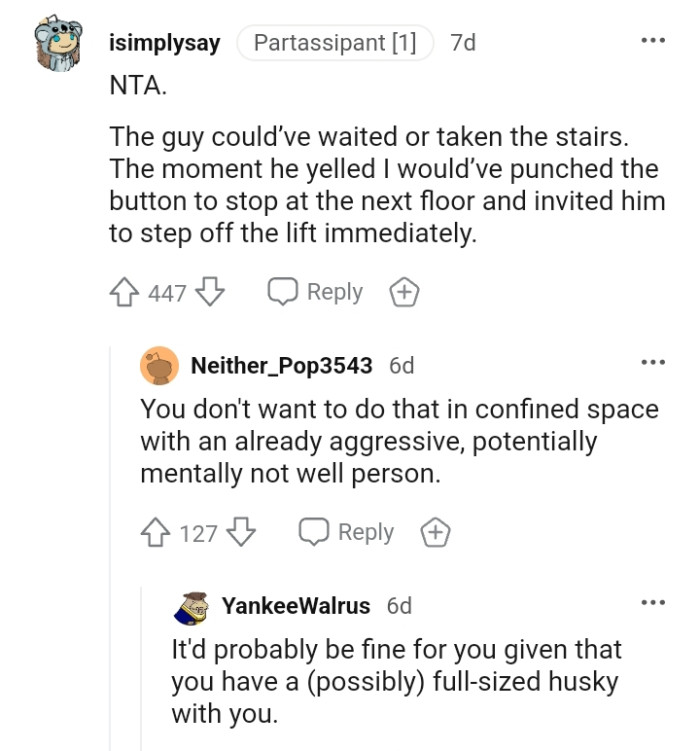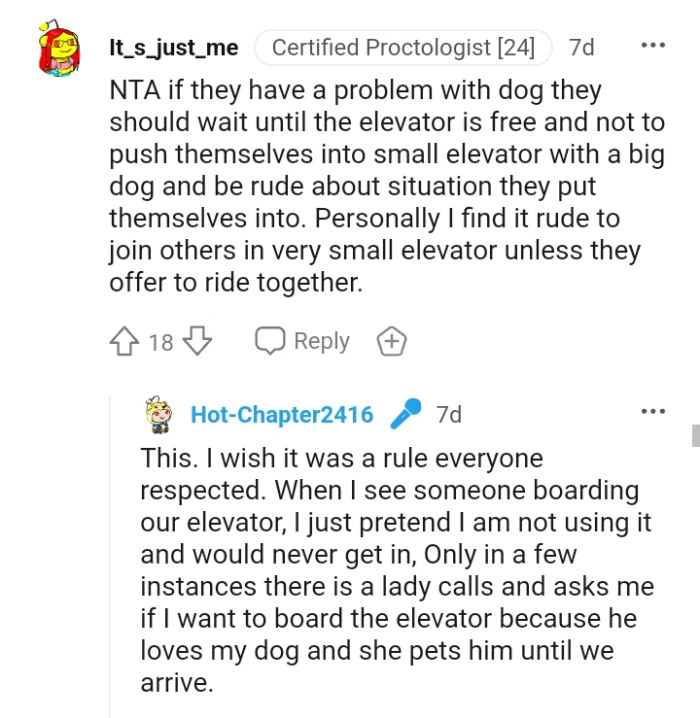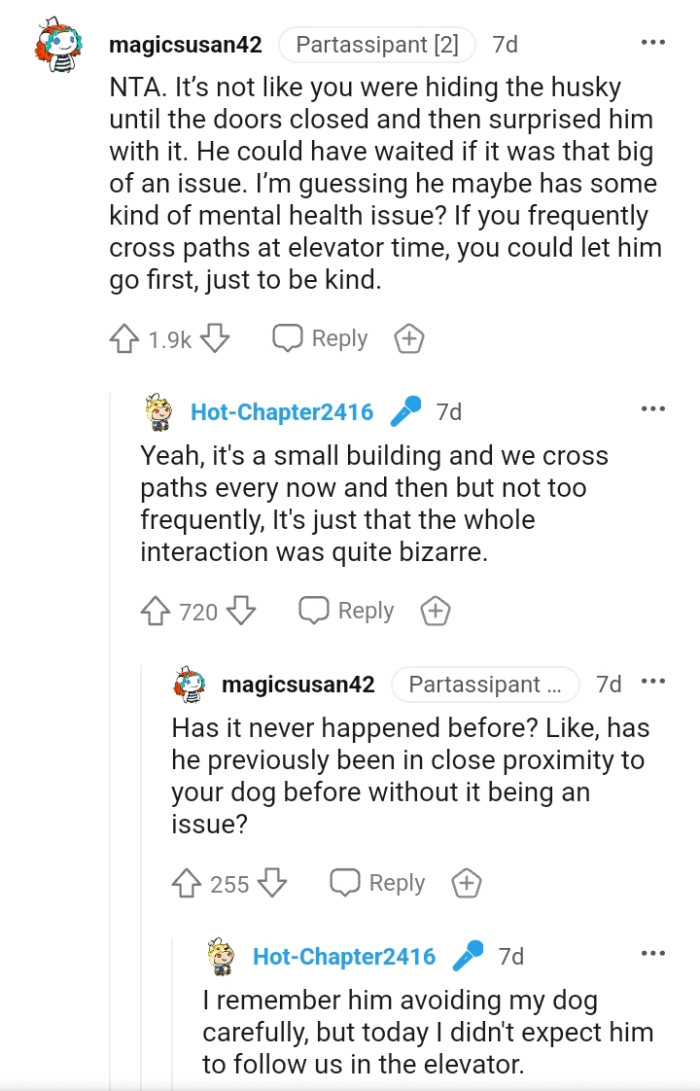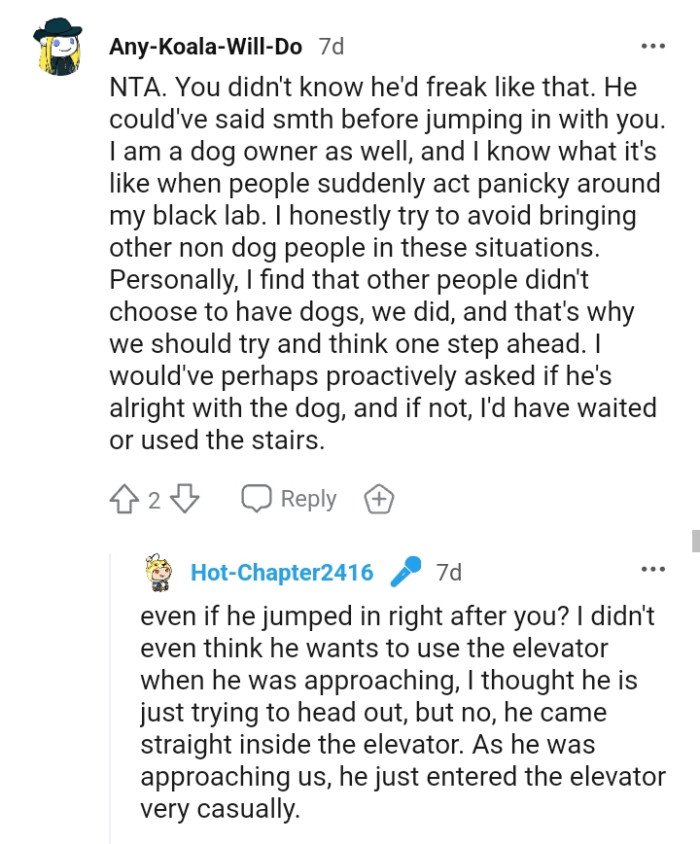Dog Owner Refuses To Give Up The Elevator To Someone Who Has A Dog Phobia
Anxiety illnesses called phobias make people fearful of things or situations that are typically harmless. They entail undue worry about an occurrence or circumstance that, in reality, is unlikely to be harmful.
And they frequently react in an unexpected way to situations that other people would not find frightening or concerning. Cynophobia is an extreme aversion to dogs.
When people with this condition think about, see, or come into contact with a dog, they experience intense fear and anxiety. In extreme instances, this phobia may lead people to avoid environments where dogs may be present.
When they hear a dog bark, see a movie about a dog, or visit a location where a dog might be, they may experience extreme anxiety or a full-blown panic attack. In extreme cases, those who suffer from this disorder avoid friends or choose to remain home out of fear of running into a dog.
The OP in today's story met such a person. The OP has a husky and was waiting for the elevator when a guy arrived and rushed into the elevator with them.
This guy started looking scared when the OP's dog looked at him. The OP became confused as the elevator was very small and didn't know what to do at that very moment.
Read the entire story for yourself below.
The OP Begins

The guy started looking scared when the OP's dog looked at him

The OP replied a couple of comments so let's go and check them all out

Understanding Cynophobia
Cynophobia, the fear of dogs, is a specific phobia that can be debilitating. According to research published in the Journal of Anxiety Disorders, specific phobias often stem from traumatic experiences or learned behaviors. People with cynophobia may have had a distressing encounter with dogs, leading to an irrational fear that persists over time.
This fear can significantly affect daily functioning, particularly in environments where dogs are present, highlighting the importance of understanding and compassion from others.
Understanding Phobias and Social Interactions
This incident underscores the complexities of social interactions when phobias are involved, particularly in shared spaces like elevators.
Research in clinical psychology indicates that phobias, such as a fear of dogs, can significantly impact social dynamics and personal interactions.
According to Dr. Sue Johnson, a pioneer in couples therapy, "Phobias can create barriers in social settings, leading to increased anxiety for both the individual with the phobia and those around them." This highlights the need for understanding and empathy in such situations.
This Redditor would have been uncomfortable too

This Redditor is obviously finding the story funny

He could have chosen not to ride the elevator

Research in cognitive psychology reveals that people with phobias often exhibit heightened anxiety responses. Dr. Susan David, an emotional agility expert, states, "Phobias can trigger intense emotional reactions, as the brain's fear circuitry, particularly the amygdala, becomes overactive in response to perceived threats." This hyperactivity can lead to overwhelming feelings of panic and avoidance behaviors, as noted on her website susandavid.com. Understanding this neurological basis can foster empathy in social situations, encouraging individuals to approach phobic responses with patience and understanding.
The refusal to give up the elevator illustrates a potential lack of awareness or empathy for those with phobias.
Psychologists emphasize that understanding and accommodating others' fears can enhance social cohesion and reduce conflict.
Fostering empathy towards those with phobias can lead to more supportive environments for everyone involved.
His fear is preventing him from acting

The OP and his dog was there first

He simply shouldn't have taken the same elevator

Societal Implications
Social psychologists highlight the influence of societal attitudes towards animals in shaping perceptions. Dr. Jonathan Haidt, a social psychologist, states, "Negative portrayals in media can intensify fears and create environments where individuals with cynophobia feel isolated." This suggests that the stigma surrounding dog phobia is often exacerbated by societal narratives. For further insights, visit Dr. Haidt's professional website. These societal implications underscore the necessity for increased awareness and education about phobias to diminish stigma and enhance interactions between dog owners and those with fears.
Promoting Understanding in Social Settings
Educating individuals about phobias can be beneficial in reducing stigma and fostering understanding within communities.
Research suggests that awareness campaigns and education can significantly enhance empathy and support for individuals dealing with phobias.
Therapists often advocate for community initiatives that promote understanding and acceptance of mental health challenges.
You were not doing anything that is not allowed

He should be paying attention rather than rushing in

This Redditor would have punched the button to stop at the next floor

To help those with cynophobia, exposure therapy is a proven therapeutic approach. According to a meta-analysis in Behaviour Research and Therapy, gradual exposure to the feared stimulus can reduce anxiety over time. This method involves slowly introducing individuals to dogs in controlled settings, allowing them to build tolerance and coping strategies.
Engaging a licensed therapist specializing in anxiety disorders can provide tailored strategies to ensure a safe and effective experience.
To cultivate a more accommodating atmosphere, individuals can engage in discussions about fears and anxieties, fostering open communication.
Creating supportive environments where individuals feel safe to express their fears can enhance social interactions.
Additionally, practicing patience and empathy can significantly improve interactions in shared spaces.
They could have waited for the elevator to clear

The one with the problem has to leave

You can put the incident out of your mind

Coping Mechanisms
Research shows that mindfulness techniques can significantly help individuals manage phobia-related anxiety. A study published in Frontiers in Psychology found that mindfulness practices reduced anxiety levels by promoting present-moment awareness and acceptance. These skills can be invaluable for those facing dog-related fears.
Practicing mindfulness in everyday situations, such as focusing on breath or engaging in grounding techniques, can create a sense of safety and help individuals navigate their fears more effectively.
You can't be rude about a situation you put yourself into

It's a small building and they do cross paths

He does not need to get in

Important psychological principles, such as cognitive restructuring, can help individuals reframe their thoughts about dogs. According to Dr. Albert Ellis, the founder of Rational Emotive Behavior Therapy, identifying irrational beliefs is crucial for overcoming fears. His approach encourages individuals to challenge negative thoughts surrounding their phobia.
By replacing these thoughts with more rational beliefs, individuals can reshape their emotional responses and reduce anxiety over time, leading to healthier interactions with dogs.
It's not on you to get out of the way

This redditor doesn't understand why the guy was yelling

Guy has no right to ask you to leave

Community Support
Creating supportive environments can be beneficial for those with cynophobia. Dr. Jonathan Haidt, a social psychologist, emphasizes that "community support can significantly reduce anxiety and foster resilience." Building connections with understanding individuals can foster feelings of safety and acceptance, as noted on his professional website, jonathanhaidt.com. Community initiatives, such as support groups for individuals with phobias, can provide a space for sharing experiences and coping strategies, enhancing resilience and reducing isolation.
He could have said something before jumping in

Redditors understood the OP's point of view. Besides, he and his dog were the first to enter the elevator, so the guy was to be blamed for dashing in without checking his environment first.
In the end, the OP got the "not the AH" verdict, and you too can drop your own opinions about this story in the comments section below.
Psychological Analysis
This situation highlights the importance of empathy in social interactions, particularly when dealing with individuals who have specific phobias.
It's essential for individuals to be aware of how their actions can impact others, fostering a more supportive community atmosphere.
Analysis generated by AI
Analysis & Alternative Approaches
In conclusion, navigating social interactions involving phobias requires sensitivity and understanding.
By fostering empathy and awareness, communities can create more inclusive environments for everyone.
Psychological Framework & Solutions
Understanding phobias like cynophobia requires a compassionate approach rooted in psychological research. By recognizing the underlying mechanisms of fear, society can create more supportive environments for those affected. Implementing techniques like exposure therapy, mindfulness, and community support can significantly improve outcomes for individuals struggling with phobias.
Ultimately, fostering empathy and awareness is essential in navigating the complex interactions between dog owners and those with fears, promoting a more inclusive society for everyone.



